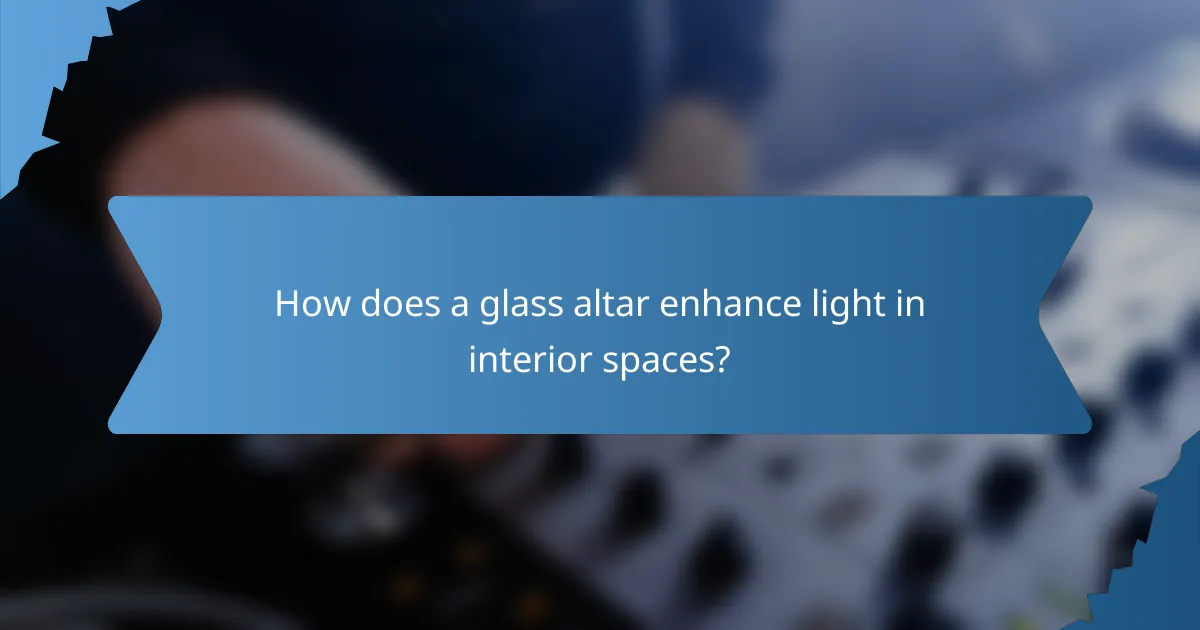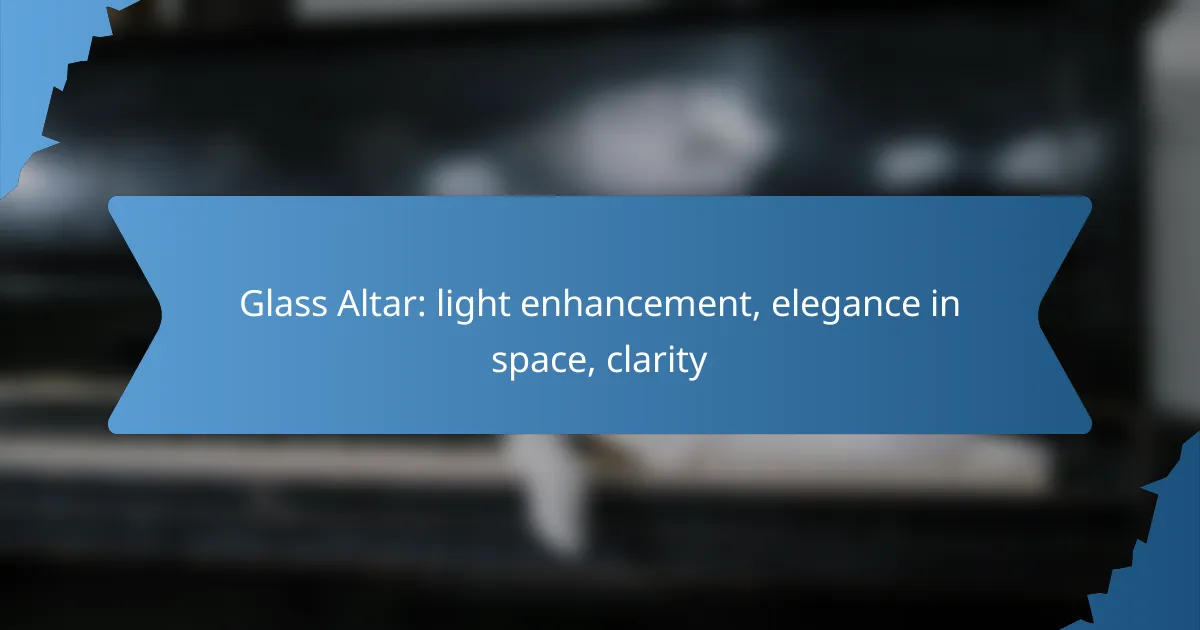A glass altar serves as a stunning design element that enhances light in interior spaces, allowing natural illumination to flow freely while reflecting it to create a brighter atmosphere. Its elegant appearance adds sophistication and clarity, making it a favored choice for both religious and decorative settings. By fostering a sense of openness, glass altars transform environments into inviting and tranquil spaces.

How does a glass altar enhance light in interior spaces?
A glass altar enhances light in interior spaces by allowing natural light to pass through and reflecting it, creating a brighter and more open atmosphere. This design element not only improves illumination but also adds a sense of elegance and clarity to the environment.
Maximizes natural light
Glass altars are designed to let in maximum natural light, which can significantly brighten a room. By positioning the altar near windows or in well-lit areas, you can take advantage of sunlight throughout the day. This approach reduces the need for artificial lighting, leading to energy savings and a more inviting space.
To optimize natural light, consider the orientation of your space. South-facing windows typically receive the most sunlight, making them ideal for placing a glass altar. Additionally, using clear or lightly tinted glass can enhance this effect without obstructing views.
Reflective surfaces increase brightness
The reflective properties of glass contribute to increased brightness in a room. When light hits the surface of a glass altar, it bounces off, illuminating surrounding areas and creating a luminous effect. This can be particularly beneficial in smaller or darker spaces where light is limited.
To maximize this effect, choose glass with a polished finish, as it will reflect more light compared to frosted or textured surfaces. Incorporating mirrors or other reflective materials nearby can further amplify brightness and enhance the overall aesthetic.
Creates an illusion of space
A glass altar can create an illusion of space, making a room feel larger and more open. The transparency of glass allows for unobstructed sightlines, which can visually expand the area and reduce feelings of confinement. This is especially useful in compact interiors where maximizing space is essential.
To enhance the illusion of space, consider using a glass altar in conjunction with light colors and minimalistic decor. Avoid bulky furniture that can clutter the area, and instead opt for streamlined pieces that complement the airy feel created by the glass altar.

What are the design benefits of using a glass altar?
Using a glass altar offers significant design benefits, including enhanced light reflection, an elegant appearance, and a sense of clarity in any space. These attributes make glass altars a popular choice for both religious and decorative purposes.
Elegant aesthetic appeal
The elegant aesthetic of a glass altar can transform any environment, creating a focal point that draws attention. Its transparency allows for light to pass through, which can enhance the overall ambiance of a room. This quality makes glass altars suitable for both traditional and contemporary settings.
Furthermore, the sleek surface of glass can be complemented with various lighting options, such as LED strips or spotlights, to create a stunning visual effect. This combination of light and glass can evoke a sense of serenity and sophistication.
Versatile integration with decor
Glass altars can seamlessly integrate into a wide range of decor styles, making them a versatile choice for various settings. Whether in a modern home, a spiritual space, or an art gallery, their clear design allows them to blend with surrounding elements without overwhelming the space.
Consider pairing a glass altar with natural materials like wood or stone to create a balanced look. Additionally, glass can complement vibrant colors or intricate patterns, enhancing the overall design without clashing.
Modern and minimalist styles
Glass altars are particularly well-suited for modern and minimalist styles, where simplicity and clean lines are key. Their unobtrusive nature allows them to maintain the focus on other design elements in the room while still providing a functional space for rituals or displays.
When selecting a glass altar for a minimalist design, opt for pieces with simple shapes and minimal embellishments. This approach will ensure that the altar contributes to the overall aesthetic without detracting from the intended simplicity of the space.

How does clarity impact the perception of space?
Clarity significantly enhances the perception of space by allowing light to flow freely and creating an unobstructed view. This effect can make areas feel larger and more inviting, contributing to an overall sense of openness and tranquility.
Enhances visual openness
Clear materials, such as glass, create a seamless transition between spaces, which enhances visual openness. When light passes through glass, it reduces the visual barriers that can make a room feel confined. This is particularly effective in smaller areas, where the use of transparent elements can create an illusion of expanded dimensions.
Incorporating glass elements like walls, partitions, or furniture can significantly alter the perception of a room. For instance, a glass altar in a living space can draw the eye and make the area feel more expansive, allowing for a greater flow of light and energy.
Reduces clutter perception
Clarity in design helps to minimize the perception of clutter by allowing the eye to focus on fewer visual distractions. Transparent surfaces can make it easier to organize items and maintain a clean aesthetic, as they do not compete with the surrounding decor. This is especially beneficial in modern interiors where simplicity is key.
Using glass for shelving or display cases can create a sense of order while showcasing items without overwhelming the space. By reducing visual noise, clarity can transform a chaotic environment into one that feels more organized and serene.
Promotes a serene atmosphere
A clear and open environment fosters a sense of calm and tranquility. The unobstructed views and natural light that clarity provides can significantly enhance mood and well-being. Spaces that incorporate glass elements often feel more peaceful, as they allow for a connection with the outdoors.
To create a serene atmosphere, consider using glass in areas where relaxation is key, such as living rooms or meditation spaces. The reflective quality of glass can also enhance the ambiance by creating soft light reflections, further contributing to a peaceful environment.

What factors should be considered when choosing a glass altar?
When selecting a glass altar, consider the size and scale of the space, the type of glass and its finish, and the structural support and safety features. Each of these factors plays a crucial role in ensuring that the altar not only enhances the aesthetic appeal of the room but also functions safely and effectively.
Size and scale for the room
The size and scale of the glass altar should complement the dimensions of the room. A large altar in a small space can overwhelm the area, while a small altar in a spacious room may appear lost. Aim for a balance where the altar becomes a focal point without dominating the surroundings.
As a guideline, consider the altar’s height, width, and depth in relation to the room’s overall proportions. For example, an altar that is about one-third the width of the wall it sits against often creates a harmonious look. Measure the available space carefully to ensure a proper fit.
Type of glass and finish
The type of glass used for the altar significantly affects its appearance and functionality. Options include tempered glass for durability, frosted glass for a softer look, and clear glass for maximum light enhancement. Each type offers a different aesthetic and practical benefit.
Finishes also play a role; polished edges can add elegance, while matte finishes may provide a more subdued look. Consider the overall design theme of the space when selecting glass types and finishes to ensure cohesiveness.
Structural support and safety
Ensuring adequate structural support is vital for the safety of a glass altar. It should be designed to bear the weight of any items placed on it without risk of tipping or breaking. Check that the base is sturdy and that the glass is appropriately thick, typically at least 10 mm for stability.
Additionally, consider safety features such as rounded edges or protective coatings to minimize injury risks. Adhering to local building codes and safety regulations is essential to ensure that the altar meets necessary standards for use in public or private spaces.

What are the maintenance requirements for glass altars?
Maintaining glass altars involves regular cleaning, protection against scratches, and long-term care to preserve their elegance and clarity. Proper maintenance ensures that the glass remains visually appealing and functional in any space.
Regular cleaning methods
To keep glass altars looking pristine, use a soft, lint-free cloth and a gentle glass cleaner. Avoid abrasive materials that can scratch the surface. For everyday cleaning, a mixture of water and vinegar can effectively remove smudges and fingerprints.
Clean the altar regularly, ideally once a week, to prevent buildup of dust and grime. For deeper cleans, consider using a microfiber cloth to avoid streaks and enhance clarity.
Preventing scratches and damage
To prevent scratches on glass altars, avoid placing heavy or sharp objects directly on the surface. Use coasters or protective pads for items that may scratch or chip the glass. Additionally, be mindful of cleaning tools; always opt for soft materials.
Consider applying a protective film or coating designed for glass surfaces, which can help resist scratches and make cleaning easier. Regularly inspect the altar for any signs of wear or damage to address issues promptly.
Long-term care tips
For long-term care of glass altars, maintain a stable environment with controlled humidity and temperature to prevent warping or cracking. Avoid exposing the glass to extreme heat or direct sunlight for prolonged periods.
Periodically check for any loose fittings or supports, especially if the altar is part of a larger structure. If necessary, consult a professional for repairs or refinishing to ensure the altar remains in excellent condition over time.
